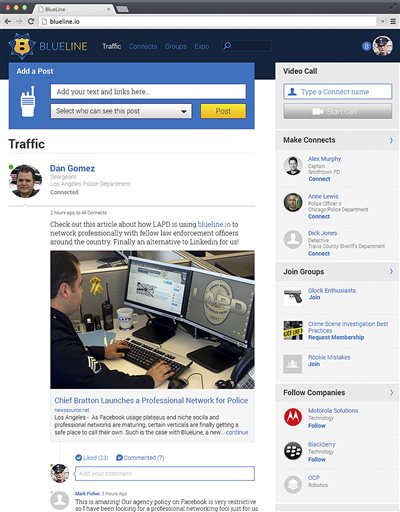
By TERRY COLLINS
In this screen grab provided by BlueLine shows the BlueLine webpage. Bill Bratton, the former head of the New York and Los Angeles police departments, is in the final stages of launching BlueLine, a social media network exclusively for the men and women in blue, a la Facebook, with “likes” and sharing. The goal of the network is for law enforcement agencies to safely share information on cases as well as the latest trends in crime and fighting it. The network is currently being tested by Los Angeles-area agencies and is scheduled nationwide this fall. (AP Photo/BlueLine)
SAN FRANCISCO (AP) — The final stages are near completion for the launch of a law enforcement social media network designed exclusively for the men and women in blue.
Created by former high-profile New York City police commissioner and Los Angeles Police Chief Bill Bratton, BlueLine is being touted as a site where officers can share their expertise, insight and information securely through video, instant messaging, videoconferencing and screen share capabilities.
The network is scheduled to go live at the International Association of Police Chiefs’ annual conference in Philadelphia in late October, Bratton said.
Regarded as an international expert on reducing crime, combating gang violence and improving police-community relations, Bratton said there’s been a longstanding belief that federal, state and local agencies work closely, especially since the Sept. 11 attacks.
That’s not entirely true, Bratton said, adding that he hopes BlueLine will be another tool to help bridge the gap. Those who join will be accredited members of law enforcement. They also will be able to create databases, have PowerPoint meetings and search for other members via name, topics and interests.
“This is a big void that needed to be filled,” Bratton said. “Our intent is to have officers locate their counterparts and closely interact with each other on a number of topics such as gangs and counterterrorism as well as share their best practices and strategies.”
No stranger to meshing technology with crime-fighting, Bratton is widely credited with co-creating Compstat, the innovative crime-mapping system used in New York, Los Angeles and several other major cities. Compstat uses computer data to direct police to specific high-crime areas.
Police in San Francisco credit the system with helping that city recently reach near record-low crime levels.
Bratton said BlueLine was conceived earlier this year and created by his New York-based venture capitalist-backed startup, Bratton Technologies, after hearing for years that fellow officers didn’t have a safe network to share information with each other.
BlueLine is currently being beta-tested among 100 officers within the Los Angeles Police and L.A. County Sheriff’s departments and the University of Southern California’s campus police.
While initial reports have compared BlueLine to Facebook, company officials say it will more closely resemble popular social media business-oriented sites like LinkedIn. BlueLine will also allow companies who sell products geared for law enforcement to market to the more than 17,000 agencies the network hopes to lure.
“Our focus is to have a walled community where you’re verified and authenticated, so you have a safe form of communication with law enforcement, analysts and administrators,” said David Riker, Bratton Technologies’ president.
That wall of security is extremely important, said longtime Los Angeles Police Capt. Sean Malinowski, who has a group of officers testing BlueLine.
“We’re already seeing a lot of potential with it,” Malinowski said. “This is not a traditional ‘social media site,’ even though you can share files, photos and stuff. It’s really specific to the subject matter and expertise that officers want to divulge with each other.”
Malinowski said BlueLine is long overdue.
“That’s the thing with innovations. You are always asking questions like, ‘Why didn’t we have this already?'” Malinowski said.
However, Malinowski said most officers have some safety and privacy concerns using social media sites due to the dangers associated with their jobs.
“They try not to be as traceable because there are threats made against officers all of the time,” said Malinowski, who is also married to a police officer. “You try not to be paranoid about it, but it does cross your mind.”
BlueLine will require multiple verifications for members of law enforcement to join and enter the network, Weiss said. He added that the platform will be housed in a secure data center that is compliant by the U.S. Dept. of Defense and the FBI’s Criminal Justice Information Services.
Also, Weiss said BlueLine will not be a venue where law enforcement can share information about specific criminal cases with each other.
BlueLine, however, will join the ranks of other law enforcement resource/information-sharing sites, including PoliceOne. BlueLine’s emergence also comes as police departments — many shrinking in manpower due to budget cuts — have begun experimenting with social media, according to a report by the U.S. Department of Justice and the Police Executive Research Forum, a Washington, D.C.-based think tank for police chiefs.
The joint study released in May noted that in a recent survey of 800 law enforcement agencies, 88 percent reported using social media ranging from preventing crime, community policing to investigations and intelligence gathering, but only 49 percent had a social media policy.
“I think we’re just on the front-end of understanding how social media can help, especially during a crisis,” said Chuck Wexler, the Police Executive Research Forum’s executive director. “I don’t think we’ve fully recognized its full potential.”



